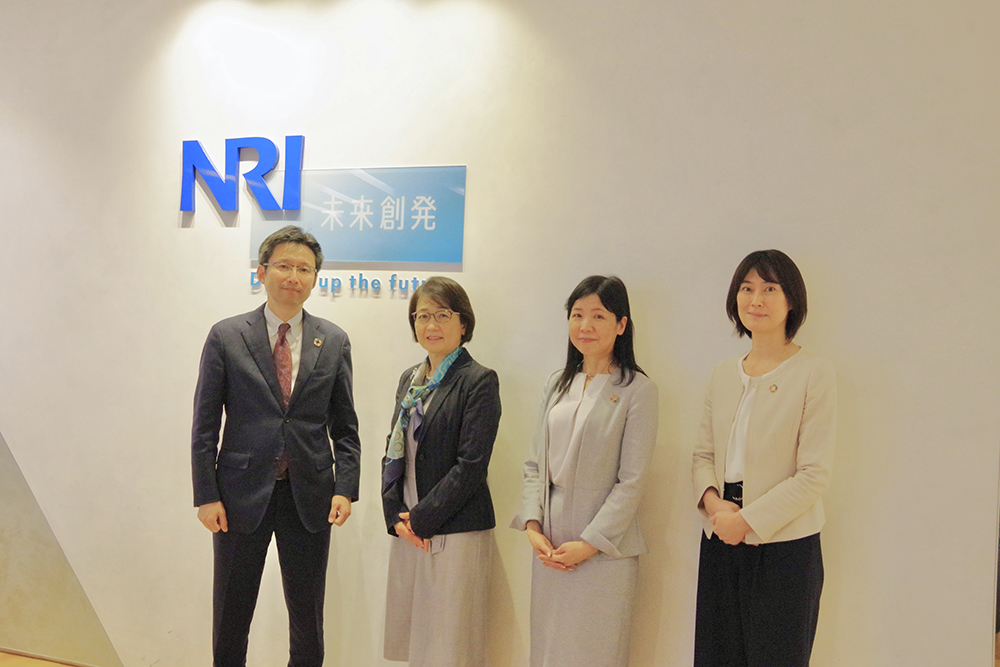
From left: Takeshi Hihara of NRI, Chiharu Takakura, Director and CHRO of Rohto Pharmaceutical Co. Ltd., Kaga Yanagisawa, and Eiko Ibuki of NRI
- CHRO: Chief Human Resource Officer
Nomura Research Institute, Ltd. (hereinafter "NRI" has been holding dialogue with external experts every
year since
FY 2010 in order to understand global sustainability trends and reflect those trends in management
strategy and risk
management.
In our 10th such dialogue, held in FY 2022, we exchanged opinions with experts in various fields related
to the
environment and human capital.
This article summarizes the dialogue held on December 5, 2022, with Chiharu Takakura, Director and CHRO*
of Rohto
Pharmaceutical Co. Ltd., who has an extensive professional experience in the fields of human resources
and human
capital both in Japan and overseas. She is also a member of multiple review committees of the Ministry
of Economy,
Trade and Industry (METI). In this dialogue, Chiharu Takakura had a discussion with Takeshi Hihara and
Kaga
Yanagisawa, Senior Managing Directors of NRI, regarding the themes, “Significance of Human Capital
Management,” “Relationship between the Growth Story of NRI (including Group) and Human
Resource
Development,” and “KPI (Key Performance Indicators) and Information Disclosure aligned with
the
Management Strategy.”
Participants
(Affiliation and position as of December 2022)

Ms. Chiharu Takakura
CHRO, Rohto Pharmaceutical Co. Ltd.
Chiharu Takakura joined the Ministry of Agriculture, Forestry and Fisheries (MAFF) after
graduating from
college. She completed her MBA degree from the United States. After completing her studies, she
worked at
Sanwa Research Institute and Gemini Consulting, where she was engaged in human resource
development
associated with new business and was appointed HR Department Head at Pfizer in 1999, Becton
Dickinson Japan
in 2004, and Novartis Pharma Japan in 2006. From 2014, she is leading the establishment of a HR
system at
Ajinomoto to promote its global strategy. In April 2020, she became Director of Rohto
Pharmaceuticals Co.
Ltd., and serving as the Director and CHRO since April 2022.
She is also a member of the “Study Group toward Achieving Human Capital Management” of METI and
serves as an
external director of Niterra Co., Ltd.
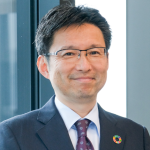
Takeshi Hihara
Senior Managing Director, Chief Sustainability Officer, NRI
Takeshi Hihara joined Nomura Research Institute (NRI) in 1991. In June 1997, he served at the Consulate General of Japan in San Francisco under deployment by the Ministry of Foreign Affairs. He was then appointed as the Head of Business Strategy Office and PAR Support Office in 2015, followed by Managing Director, Deputy Division Manager of Business Strategies, and Business Strategy Division Manager in April 2017. In April 2019, he was appointed as Senior Managing Director and from April 2021, he is serving as Executive Officer of Business Strategies for Corporate Communications, Legal & Intellectual Property, Information Systems, and IR.

Kaga Yanagisawa
Senior Managing Director, Head of Corporate Planning, Human Resource and Human Resource Development, NRI
Kaga Yanagisawa joined Nomura Research Institute (NRI) in 1991. She was appointed as Group Manager of the Management Consulting Department in October 2012, Division Manager of the Management Consulting Department in April 2015, and Financial Consulting Department in April 2017, followed by ICT Media and Service Industry Consulting Department in April 2018. In April 2019, she was appointed as Executive Officer, Deputy Head of Human Resources, and Head of Human Resource Development, followed by becoming Senior Managing Director, Head of Corporate Planning, Human Resources, Human Resources Development in April 2021.
(Other participants from NRI)
Eiko Ibuki
Group Manager, Sustainability & Responsibility Group, NRI
Introduction (Sustainability Management and Human Capital Initiatives by NRI)
NRI: At first, we would like to talk about sustainability management and human capital initiatives by NRI. After that, we would like to have a dialogue regarding the themes “Significance of Human Capital Management,” “Relationship between the Growth Story of NRI and Human Resource Development,” and “KPI (Key Performance Indicators) and Information Disclosure aligned with the Management Strategy.”
(At the outset, Hihara explained “Sustainability Management in NRI” and “Role of Human Capital in the Growth Story of NRI Group,” with Yanagisawa explaining “Human Capital Initiatives by NRI”)
Growth Story of NRI and Role of Human Capital
NRI: Please tell us what you thought about the “growth story of NRI and role of human capital” for the year 2030.
Ms. Takakura, Rohto Pharmaceutical Co. Ltd.:
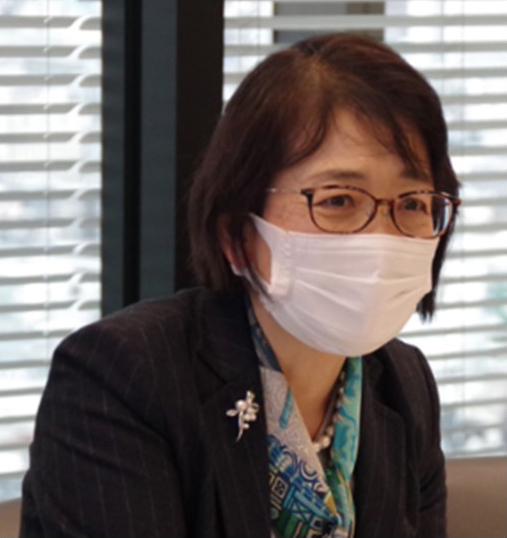
The disclosure materials published by NRI, such as integrated reports and ESG data books, are
highly
detailed, thoughtful, and full of information. Especially, the way ESG data book covers NRI
Group’s
information comprehensively is impressive. I think it is necessary that the content of these
disclosures
should be in a form that is easy to understand, like how they are connected to the company's
vision or
purpose, and should be conveyed as an easy-to-understand
story.
There are two major social trends which are related to the
purpose of
NRI.
The first one is initiatives related to DX*1,
which is
required from a social perspective. In the past, when the focus was on DX 1.0, the key to growth
and
transformation was the digitalization of existing businesses. Today, digitalizing the business
processes and
infrastructure that form the basis of business through DX 1.0 is becoming a common practice. In
addition, DX
2.0, focused on developing platforms that could transform the business models of entire
industries. Since,
it is becoming essential to consider how to use digital as a tool for transforming society, I
believe that
DX 3.0 will be required in the future.
The second point is the trend required from the perspective of operating companies. As the term “CX*2” suggests, the most
important issue for
companies in the future will be to transform themselves. The theme of
sustainability is
profoundly related to the transformation of companies. Also, it is said that “human
resources”
are the key to achieving the CX and sustainability. The reason why companies are focusing on new
themes such
as CX and sustainability is because of their concern that they may not be able to achieve
sustainable growth
with the existing value standards and values.
Over the past two to three years, there has been a shift in the environment where companies are
unable to
achieve sustainable financial growth without addressing “non-financial areas,” such
as solving
social issues and creating value for society. These non-financial initiatives, such as solving
social
issues, are linked with the value co-creation espoused by NRI. In particular, intellectual companies like NRI believe that society has high
expectations from
their initiatives in leading their client companies in the direction of creating new
values.
The way NRI values the future of society by providing an insight into which direction society is
heading and
how it will change in the future is a very challenging task. No
one really
knows what will happen in the future society. Therefore, I
believe that NRI's "forum" will become invaluable in the future, as it provides a platform
for
professionals of diverse talents (skills) to gather, discuss, and study the world's most
advanced
knowledge from diverse directions.
Hihara (NRI):
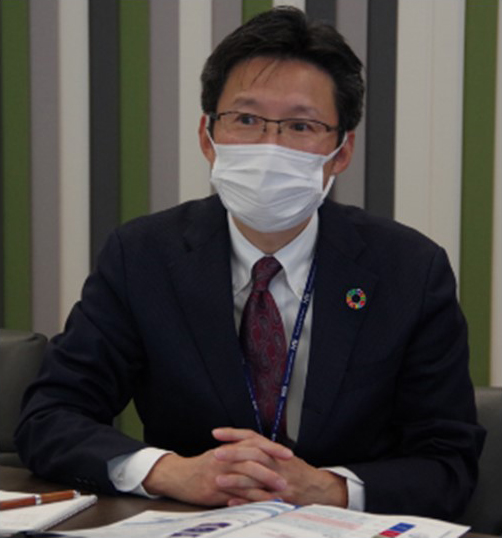
We are currently formulating a new management vision V2030 for the year 2030. Although the
corporate
philosophy of NRI states “to discern new social paradigms and implement them,” I
believe we were
not clear about what kind of society we are aiming to create. We
had internal
discussions for nearly two years to formulate the new vision, including discussions on what
kind of
society NRI should contribute to in building, which is close to the company’s
corporate mission.
And through this process, we have continuously honed our corporate terminology and finally
concluded
what kind of society we should create.
As Ms. Takakura said, human resources are essential for achieving the vision, we have also
decided the kind
of values to be shared among all employees, including those in the group. We are also planning
to convey the
values and the society we are aiming to create by incorporating them into our corporate
philosophy. The
official announcement regarding this will be made in April 2023.
Through this new vision, NRI will place “value
creation” under
materiality (a key issue for the company) and specify which direction NRI is aiming to
pursue through
its business, along with how human and other capitals are related to the vision and value
creation.
Ms. Takakura:
Once NRI provides a perspective on its purpose in society, it will naturally become clear as to what kind of expertise or diversity of human resources will be required by using backcasting (a method of reflecting on what should be done in the present by looking back from the future).
-
※1 DX:
Abbreviation for Digital Transformation. It refers to the use of digital technology to transform business and other areas.
-
※2 CX:
Abbreviation for Corporate Transformation. It refers to the process of transforming a company from its foundation.
Link between the Growth Story of NRI and Human Resource Development
NRI: Please tell us your views on NRI's human capital management approach to realize the growth story.
Ms. Takakura:
Based on our discussion so far, it is necessary to disseminate “the unique human capital
management of
NRI.” Although various companies are engaged in human capital management, some characteristics
are unique
to NRI. One of them is the ability to gain insight into the future society from a macro perspective.
It is very important for the future society that suggestions and
proposals are made
from a macro perspective regarding how “prosperous and vibrant society” can be
created in the
future. The fact that human resources are engaged in a friendly competition to derive the
answers to these
questions is something unique to NRI. Though various operating companies have a future
vision, they
tend to focus only on daily activities, such as what they can achieve through their
“products.”
Surprisingly, due to the nature of their business, it is difficult to have a broader view of society
as a whole.
However, the business characteristics of NRI are very different from
that of
manufacturing and other industries. In particular, since NRI is developing business that provide
both
consulting and solution services to clients, it can consider ways of utilizing these from a
macro
perspective. In addition, NRI can also suggest how human capital management can be implemented
in the
world. I understood your explanation of "human capital being the origin of value
creation."
However, if the results of future insight differ greatly from the actual business and social
conditions, it is
of no value. Hence, it is not an easy task to provide future insights from a macro perspective.
Having both insights into the future and a perspective that
recognizes the underlying
trends in people's lives and actual business, although these two are contradictory, will be
essential.
Moreover, the ability to consider how future insights are linked to actual business trends by
switching back
and forth between macro and micro perspectives will be necessary. Therefore, I would appreciate
it if NRI
can value the consumer’s persecptive in real life and business.
For example, in the manufacturing industry, handling the consumer needs is important, with some
companies making
a conscious effort to incorporate consumer’s perspective creating through working styles
reforms, taking
on part-time job, dual employment, etc. If NRI engages in human
capital
management from the consumer’s perspective, which is necessary for real life and business,
it can
demonstrate its human capital management to society, create value, and provide hints.
Yanagisawa (NRI):
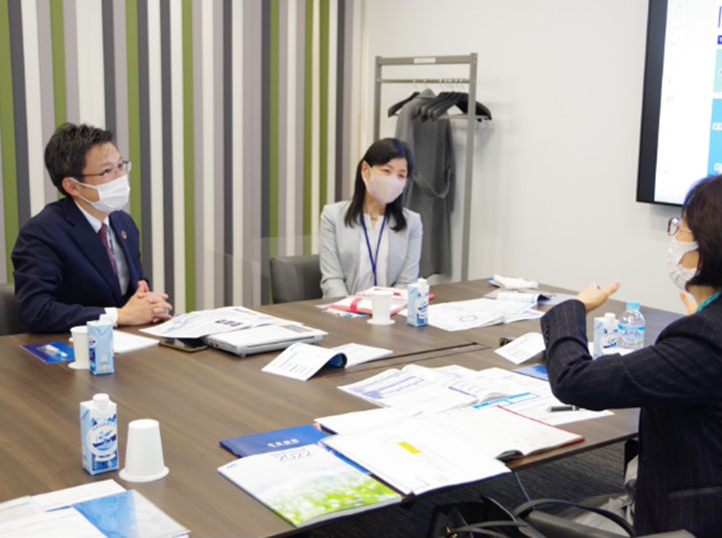
In regard to the experience as a consumer, we saw employees themselves facing challenges to maintain a good work-life balance and reform their working styles. Through consulting and providing solutions to its clients, NRI offers a range of ideas and suggestions based on its experience as a consumer.
Hihara (NRI):
It is important for the employees of the NRI Group to be aware of the consumer’s perceptions, and what is happening around the world in a timely manner. For example, it is necessary to continuously take an interest in various activities, such as reading books, learning about new technological trends, and paying attention to current issues in society (discussion and issue points). In our growth story, we mention “the capability (organizational capacity) for creating business,” and we consider that we must create a work-in-life concept (positioning work in life and daily life), allowing employees to use their working hours with ease, and make the time necessary for business creation.
Ms. Takakura:
It is important to develop creativity beyond work. In addition to this, imagination is also important. After all, a job does not mean that one person can do everything. For example, it is difficult to start farming immediately, even though you have heard about it from a farmer and think it is important to do so. However, it is important to listen to them and have the ability to imagine what they do for a living or what kind of environment they live in. However, it is very difficult to develop such ability. Candidates taking the recruitment examination at NRI have a certain level of excellence and logic, however, what’s important is how much they can think about others and consider it as their personal matter. In other words, the ability to go back and forth between others’ and their own thoughts. Such skills along with problem finding skills will become essential for creating businesses in the future. This is about proactively addressing the issues of others as their own rather than acting when someone asks.
Hihara (NRI):
It is indeed as you said. From now on, we need to be spontaneous and considerate towards others, rather just being passive. Regarding the “capability to create business,” which I mentioned earlier, one of its aspects is “conceptual ability.” This refers to the human capital that allows us to create big concepts through communication and dialogue with experts that might not be possible if done alone. As I mentioned earlier, DX 3.0 is a big concept which aims to transform society as a whole, and if we intend to proceed with this in a realistic manner, we have to incorporate diverse perspectives and develop the capabilities to create a new systems.
NRI: Next, we will discuss the diversity of human resources required to achieve our growth story.
Yanagisawa (NRI):
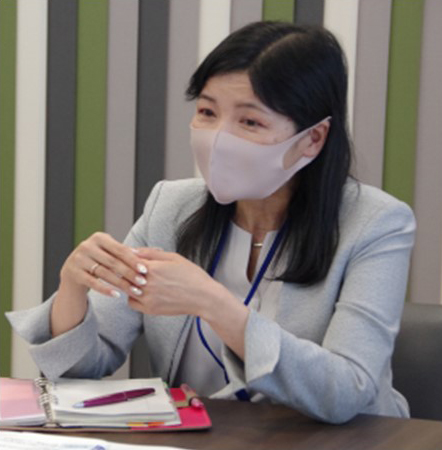
I will now talk about the diversity of human resources contributing to our growth story. One of
the
capabilities contributing to our growth story is “the ability to promote and discuss
business with a
diverse workforce.” Since we are not directly dealing with
the
consumers, some circumstances make it difficult for
us to
recognize that we need to be aware of diversity as a sense of crisis.
Many of NRI's clients are company executives and people from IT departments, with majority of
them being
male, making it difficult to discuss that, in order to match the diversity of its clients, NRI
must increase
the diversity of its workforce by including women, foreign nationals, and LGBTQ people.
As an example, in the pharmaceutical field where Rohto Pharmaceuticals is involved, how will
these
discussions on diversity narrated?
Ms. Takakura:
Actually, after Rohto started its cosmetics business, there have been a change in the composition,
and now the
number of women employees in the company has increased. The number of female scientists and
pharmacists working
in research laboratories has increased because they are developing products from the perspective of
female
users. This is perhaps an area different from NRI's business environment.
The phrase “expansion of human capital through challenges and growth of diverse
professionals,”
mentioned in the growth story of NRI, could be replaced by “challenges and growth of human
resources with
diverse perspectives.” This suggests that diverse human capital
is
necessary because business creation and global business promotion require diverse perspectives.
In fact, one
person to have diverse perspectives is similarly important.
In order to have “diverse perspectives,” one must be in an unfamiliar environment, for
example,
through a part-time job, dual employment, or cross-border learning. For instance, the clients with
whom NRI
consultants deal on a daily basis are mostly senior executives of Japanese companies, resulting in a
high
percentage of male consultants, as mentioned by Ms. Yanagisawa. Thus, an unfamiliar environment
might actually
be a place away from work and the core business.
When a person is in an unfamiliar environment, a conflict arises that
their
conventional approach will not work. For example, if you are doing business in a
male-dominated
society, you will experience success in a stereotypical way, but what if a man who has experienced
such success
works in a team that has a lot of women. There, he will feel the
conflict that
his previous values do not work at all, and through such experiences, he will acquire diverse
perspectives. I believe that increasing the number of human resources with such diverse
perspectives will have “human resources with diverse perspectives” that will lead to
business
creation achieving the growth story.
Yanagisawa (NRI):
At present, there are many resources with diverse perspectives at NRI, but I also think that a style
of
promoting lean business in a very streamlined process has been developed. We tend to experience
success if we
follow the same framework, procedure, and process.
In doing so, we are not creating enough opportunities to utilize or
voice diverse
perspectives in our work. Perhaps we should give more
space and
extra time to waste (in a positive sense).
Ms. Takakura:
You are absolutely right. The recent trend toward sustainability is contrary to the business, which
prioritizes
efficiency, and it has become a movement that seeks to break this negative cycle. In this context,
the
significance of giving the business more space and extra time to “waste” in a positive
sense can be
understood.
For example, in the case of global environmental issues, it has been the trend to restore negative
impacts to
zero. However, in Europe once these impacts restored to zero, the
question of
what to do next is addressed as “Regeneration※.” This refers to
the
discussion on the next step in value co-creation, promoted by the younger generation in the
future.
Currently, NRI's client projects are mainly focused on promoting sustainability while meeting their
individual
needs. However, next to that might be projects focusing on how to
create new
businesses and social innovations from the perspective of regeneration. For this
reason, issues
such as what professionalism is, may also need to be integrated into human capital.
-
※ Regeneration:
This refers to the concept of creating the “renewal power” from the sustainability stage.
NRI: We would like to discuss how we should combine the top-down and bottom-up approaches for expanding human capital.
Yanagisawa (NRI):
NRI is basically a company with a strong culture of business divisions, with a cycle of training
human resources
within the divisions, considering transfers/opportunities, and evaluating them. Based on the current
trends in
sustainability and human capital management, the head office is also changing its approach and
encouraging
business divisions to develop various initiatives. For example, promoting “value
co-creation” in the
current mid-term management plan. Over the past few years, we
continuously
engaged in the value co-creation activities while exchanging several dialogues on the new vision
and the new
medium-term management plan, including asking the members of the business divisions to consider
how the work
is connected to each of the three social values described at the beginning. Furthermore, from
the
perspective of “value co-creation,” discussions based on formulating the new vision
for the next
mid-term management plan were held with the business divisions.
In this way, NRI is successfully maintaining its culture of utilizing the power of the workplace
through the
bottom-up approach and by the top-down approach communicating the thoughts of management and the
company through
discussions. In the future as well, NRI will continue its activities of value co-creation by
creating the
opportunities to communicate the thoughts of top management and, at the same time, promoting both
top-down and
bottom-up approaches by gathering various opinions and thoughts from the workplace and utilizing
them in
management.
Ms. Takakura:
Although it is difficult to determine the top-down or bottom-up approaches because they are related
to the
unique business characteristics of individual companies, when
business divisions
are strong, people within them are rotated internally to complete the rotation process.
As Mr.
Hihara also mentioned, it will be a matter of discussion in the
future whether
such rotation of people within the business divisions is the best approach for the
company. Though
it is important to train human resources with certain specialties, it
is also
possible that they cannot provide new value unless they gain experience in a variety of
divisions and have a
broad perspective.
In addition, how NRI's business portfolio will change in the
future is
also an important perspective. Currently, under 10% of revenue is generated from consulting and the
rest from IT
solutions, but how will it change the business portfolio in the future? Furthermore, the contents of
IT solution
services will also change according to social trends and customer needs. However, when consultation
and
full-fledged advising will be required in new IT solution services, there will be a challenge of
training the
human resources who can do it. I acknowledge that it is important to discuss that people can be trained in specific areas only, similar to past, is it
possible to
train them to provide services in an ever-changing environment?
In the “Ito Report for Human Resources※” I have stated that “every company must look at its people in a holistic and optimal
manner. Else
the people in management will face more difficulties in the future, because the higher the position
is, it will
become more important to handle the highly specialized human resources. If the game is how people
with diverse
expertise can demonstrate their value, then it will be impossible to manage them without the
knowledge of
diverse areas. It is equally important to consider training the
management team
who will lead NRI in the future and decide whether to deepen or broaden their expertise for the
future
growth of NRI's business. And, I believe it can be achieved through a “combination of the
top-down and
bottom-up approach.”
※Ito Report for Human Resources:
A Ministry of Economy, Trade and Industry (METI) report chaired by Professor Kunio Ito of Hitotsubashi
University.
The “Ito Report for Human Resources 2.0” ( published in May 2022) recognizes the importance
of
“human capital” and presents useful ideas on how to implement human capital management.
Ways to Communicate Human Capital Management to Investors
NRI: What do you think is the best way to tell investors about the quality of human capital and the excellence of NRI's human resources?
Ms. Takakura:
There are two main requirements from the investors. The first one is that they
want to see comparable indicators.
For example, if any company needs diverse perspectives, a diverse workforce, highly skilled
employees, etc., it
is important to know what KPI should be presented. It will be a good approach for NRI to form a
team of specialties with different talents (skills), women, and
mid-career
employees. It is also essential to consider what kind of investment is made in
developing human
resources. In my personal opinion, it is necessary to circulate
learning (i.e.,
input) and experience rather than showing the time and cost of education or training.
The investors
are interested in hearing whether such measures are actually being implemented.
The other one is to show the story of the company. Firstly,
the
corporate philosophy and then the three social values for creation. Lastly, human and intellectual
capital which
are important to implement these. The CHRO tells whether such measures are implemented in human
capital and are
properly connected to the overall story. And so, the investors want
the CHRO,
rather than the president, to be part of the management and tell the story of where NRI is
heading in terms
of sustainability.
NRI: At the end please give us some feedback on the whole process.
Ms. Takakura:
Thank you so much for a great time. It was clear that you are very serious about what you are doing and also very sincere perspective on the improvement areas. I believe that these two perspectives will always be necessary, and even though things are completed to a certain degree, in the uncertain times ahead, it will become even more important not to think that things are perfect or 100%. In today's discussion, I realized that it is very important for management to maintain a humble perspective of retrospect while making sincere efforts, and that this is the foundation of human resource development and continuous learning.
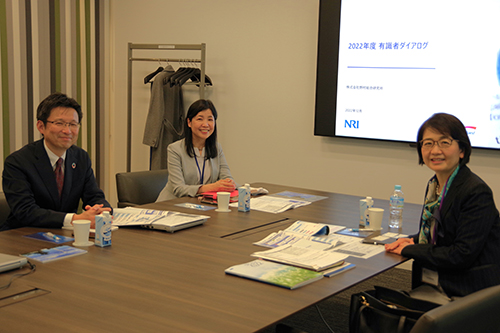
Yanagisawa (NRI):
Thank you so much for today. I learned many important keywords that amazed me. I felt that diverse viewpoints and the imagination power that comes during the discussion are important, including the importance of creating an environment where people can speak freely. Overall it was a very insightful discussion, where I realized that we need extra energy to achieve goals.
Hihara (NRI):
Thank you so much for your valuable time today. Although we are now considering incorporating human capital into our growth story and trying to reflect it in our vision and mid-term management plan, I felt that we must prepare to convey the story clearly to people beyond our company. I believe that by understanding this story, our stakeholders will understand the role of human capital, and thus our corporate value will also increase. Thank you very much.
(Published in Mar. 29, 2023)